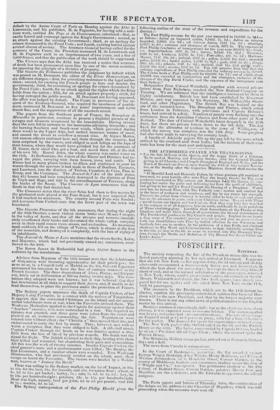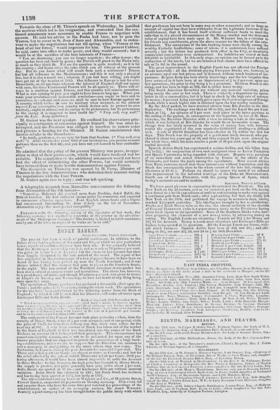The Paris papers and letters of Thursday bring the continuation
of the debate on the address in the Chamber of Deputies; whieh was still proceeding when the accounts were seat off.
Towards the close of N. Thiers's speech on Wednesday, he justified the motives which led to his resignation, and contended that the con- tinued armaments were necessary to enable France to negotiate with success. He said his advice to the Pasha had been, not to pass the Taurus, but to cover to St. Jean crAcre and Alexandria, and to endea- vour to make the negotiations last out till spring, when "France at the head of all her forces," would negotiate for him. The present Cabinet, be said, came into office to make peace, and they would succeed ; but it -would be at the sacrifice of the best interests of France- " You are disarming ; you can no longer negotiate; the affair is over ; the question has been cut short by peace ; the Powers will grant to the Pasha only as much as they think fit. For me the question is quite resolved; so it is for the country ; and hence arises the calm which you all witness at the present day. But do you know what will result from such a settlement ? France has lost all influence in the Mediterranean ; and this is not only a physical loss, but it is also amoral one ; whereas, if you had been willing, you might have got rid of the treaties of 1815. Our influence in Europe is lost for ever. Henceforth, on all questions whereon the interest of England shall not square with ours, the three Continental Powers will be all against us. There will al- ways be a coalition against France, and this country will remain powerless. ‘Vhat is now corning to pass you ought to have foreseen long ago. When you made your revolution—an boeourable revolution—you ought to Lave said to yourselves, in each and such ea,es we shall be sure to have Europe against us. A country which wishes to save its territory when menaced, as the address says—[Loog ilittrrantion-j—a country which desires only to protect its own territory, ought to reduce, not its energy to its pretensions, but its pretensions to the energy it is supposed to have credit for." '6 Very well, very well!" from the Left. Long ayitation.) N. Guizot was the next speaker. He confined his observations prin- cipally to a refutation of calumnies against himself: He was often in- terrupted, and the Presie'.ent was obliged to interfere to restore order and procure a hearing for the Minister. M. Guizot administered this laconic rebuke to the disturbers- " In truth, gentlemen, we are very far from that freedom. (" Very well, very well! ") After twenty-live years' trial of' our institutions, you possess no more patience than on the first day, and you have not yet learned to bear contradic- tion."
lie admitted that the Folicy of the present Ministry was peace, in oppo- sition to that of their predecessors, which would have rendered war in- evitable. The completion of the additional armaments would not have had the effect of intimidating the other Powers, but would certainly have induced them to mike hostile demonstrations against France.
The discussion on Thursday was opened by M. Passy, Minister of Finance in the late Administration ; who defended their conduct during the negotiations with the Four Powers.
N. Guizot again rose to reply ; and was left speaking.



























 Previous page
Previous page